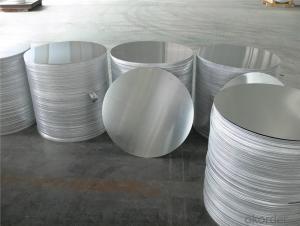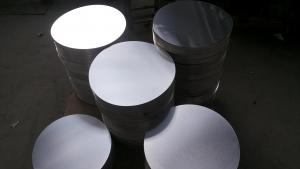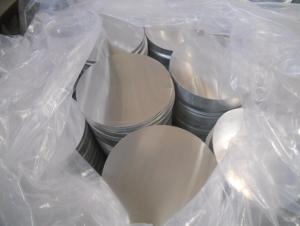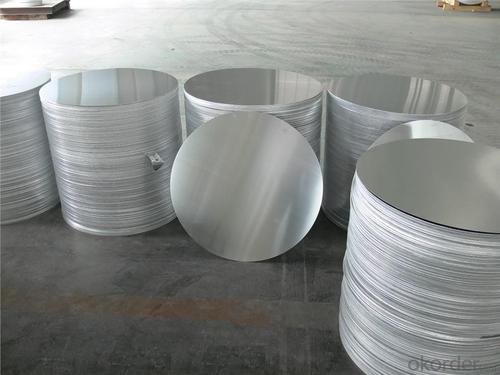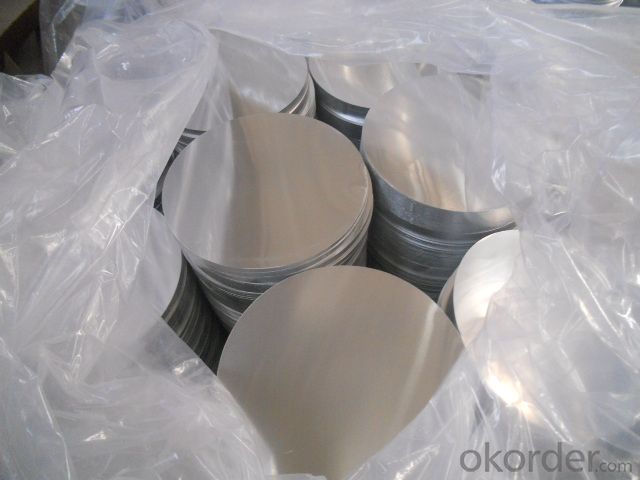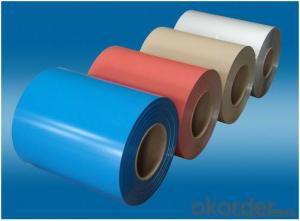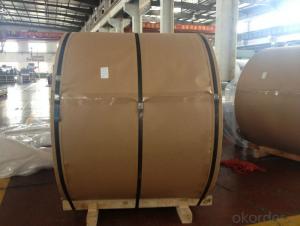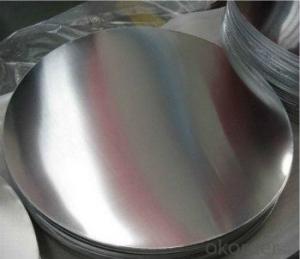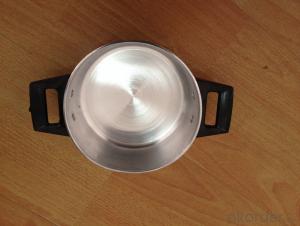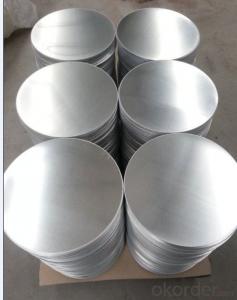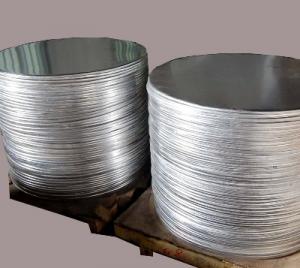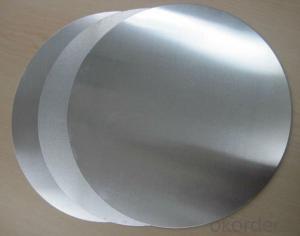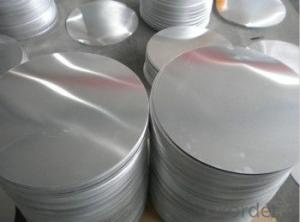Anodized Aluminum Coil Stock - Hot Rolled Aluminum Circle for Cooking Pot AA3003
- Loading Port:
- China Main Port
- Payment Terms:
- TT or LC
- Min Order Qty:
- -
- Supply Capability:
- -
OKorder Service Pledge
OKorder Financial Service
You Might Also Like
1.Structure of Product Description
Hot Rolled Aluminium Circle is one material for aluminium pot. This alloy for this circle is AA3003. Compared to continuous casting aluminium circles, the hot rolled aluminium circle can provide better mechanical quality. If you production method is deep pushing, we recommend that you use hot rolled aluminium circle.
2. Main features of the product
a.Competitive price---We have our own mills and can produce mill finished aluminium coils, so we can control the production cost better.
b.Professional after-sale service---We have more than 15 years exportation experience and you need not worry about the exporation problems.
c.Fast delivery time---We can control the delivery time within 35 days.
3. Image
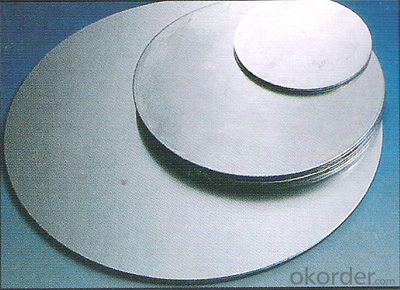
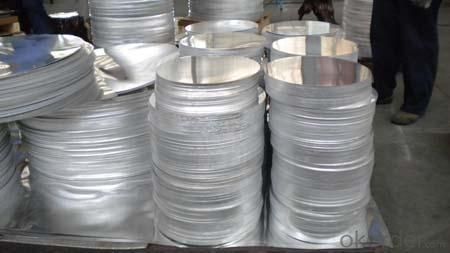
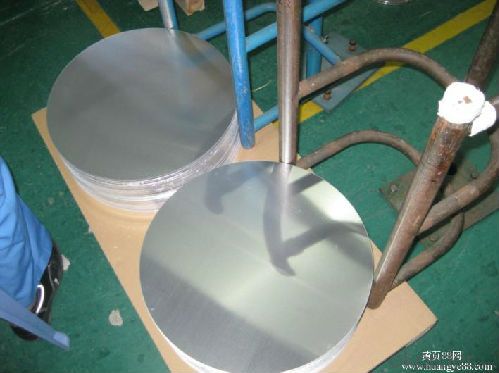
4. Product Specification
| Alloy | Temper | Production line | Thickness | MOQ |
| AA3003 | H14 | Hot Rolled | 0.2MM-3MM | 2 TONS for every size |
5.FAQ
What is the quality standard?
---Usually our standard is GB3880-2006
What is the largest width?
---It is 2300mm
What is the MOQ?
---Usually we can accept 2 tons.
- Q: What are the potential applications of embossed aluminum coils?
- The unique properties and versatility of embossed aluminum coils make them suitable for a wide range of potential applications. These coils can be used in various industries, including architecture, packaging, heat transfer, automotive, electrical, and furniture. In architecture, embossed aluminum coils are commonly utilized for decorative purposes in both interior and exterior design applications. They can enhance the aesthetic appeal of spaces by being used for wall cladding, ceiling panels, decorative facades, and other decorative elements. The embossed patterns on the coils provide visually appealing texture and depth to surfaces. The packaging industry also heavily relies on embossed aluminum coils. These coils are often employed in the manufacturing of packaging materials, such as cans, boxes, lids, and closures. The embossed patterns on the coils not only enhance the visual appeal of the packaging but also provide additional strength and rigidity, making it more durable and resistant to damage. Heat transfer applications also benefit from embossed aluminum coils. These coils are utilized in heat exchangers, evaporators, condensers, and other heat transfer equipment. The embossed patterns on the coils create turbulence in fluid flow, increasing the efficiency of heat transfer. In the automotive industry, embossed aluminum coils find applications in the manufacturing of car body panels, trims, and decorative elements. The embossed patterns on the coils can give vehicles a unique and stylish appearance, setting them apart from others. The electrical industry also utilizes embossed aluminum coils for various applications. These coils are used in the manufacturing of electrical enclosures, switchboards, and control panels. The embossed patterns on the coils enhance the structural integrity and provide better protection against external factors, such as moisture, dust, and corrosion. Lastly, the furniture industry makes use of embossed aluminum coils. These coils are employed in the manufacturing of furniture components, such as table tops, cabinet doors, and decorative trims. The embossed patterns on the coils add a touch of elegance and sophistication to the furniture, making it visually appealing. Overall, embossed aluminum coils have a wide range of potential applications due to their unique properties and versatility. They are favored in industries where aesthetics, strength, and durability are crucial factors.
- Q: is there any kind of solder or technique that can solder copper to aluminium? or is it just not possible!?
- Not using solder or other alloys of tin and lead. However, brazing may be possible. But you will need someone skillful.
- Q: I have been trying to make some thermite for a while now, and I haven't had much success. I have tried using iron oxide and that didn't work. then I tried using manganese dioxide, also without success. I'm pretty sure I have the right proportions for each of the corresponding oxides, but it just isn't working. I am using magnesium ribbon to light it.The aluminum I am using is the byproduct of me trying to cut a block of aluminum with a hacksaw (best way I have available to cut it) and there is a lot of aluminum powder that is being made. But i'm not sure if it is fine enough to be effective. I don't have an etch-a -sketch so that's not an option. I know that it has to be fairly fine grained, but how small do the particles need to be?FOR EVERYONE WHO IS GOING TO TRY AND TELL ME THAT MAKING THERMITE IS DANGEROUS OR SOMETHING ALONG THOSE LINES......DONT!!!!!!!!.......... IM NOT GOING TO LISTEN SO SAVE YOURSELF THE TYPING AND ME THE READING
- In 35+ years of demonstrating the thermite reaction, I have used fine aluminium powder to quite visible small bits. The proportions don't seem too critical, but try and keep near the amounts represented by the balanced eqtn. The difficult bit is getting the wretched stuff to ignite. With some mixes several strands of magnesium ribbon as fuse still wouldn't get it to ignite. I found a pile of 'ignition powder' at the base of the Mg often helped. There was a good commercial one available in the UK but I often made one up, main ingredients barium peroxide and magnesium powder, about 50/50. Needless to say, ignite with this mix where you won't breathe any nasty fumes. To get a good result, if I didn't use a proper crucible, I shaped one of Al foil about the capacity of 2-3 eggcups. This was put on sand in a big coffee tin, then more sand added to fill round the sides. This would give a good amount of iron. I once made the mistake of rushing in too quickly to get out the red hot iron.... and completely melted the ends of a large pair of Nickel tongs!
- Q: What are the different coil cutting options for aluminum coils?
- There are several coil cutting options for aluminum coils, including slitting, shearing, and saw cutting. Slitting involves cutting the coil into narrower strips using circular knives, while shearing uses straight blades to cut the coil into desired lengths. Saw cutting, on the other hand, involves using a saw blade to cut the coil into specific shapes or sizes. These cutting options provide flexibility in meeting various manufacturing and fabrication requirements for aluminum coils.
- Q: Is it possible to join steel coils using arc welding or gas welding techniques?
- <p>Yes, steel coils can be welded together using both arc welding and gas welding methods. Arc welding, specifically processes like Shielded Metal Arc Welding (SMAW) and Gas Metal Arc Welding (GMAW), is commonly used for joining steel due to its strength and versatility. Gas welding, which uses a fuel gas and an oxygen mixture to produce a flame, is also suitable for steel welding, although it may be less common in industrial settings due to the higher heat input and potential for distortion. Proper techniques and equipment are essential to ensure a strong, durable weld and to avoid defects such as cracking or warping.</p>
- Q: What are the potential health hazards of working with aluminum coils?
- Several potential health hazards can arise from working with aluminum coils. One primary concern involves the exposure to aluminum dust or fumes. When aluminum is cut, shaped, or welded, it releases fine particles or fumes that can be inhaled. Prolonged exposure to aluminum dust can irritate the respiratory system, leading to coughing, wheezing, and shortness of breath. In some cases, it can even result in lung damage or respiratory disorders like asthma. Another health hazard related to aluminum coils is the possibility of skin contact with aluminum salts or compounds. Various forms of aluminum salts, such as aluminum hydroxide or aluminum chloride, can cause skin irritation, rashes, and even dermatitis, particularly in individuals with sensitivities to them. Additionally, aluminum coils might be coated with different substances, including lubricants or coatings, which may contain potentially harmful chemicals. These chemicals can penetrate the skin or be released as fumes when the coils are heated or processed. Exposure to these chemicals can result in skin irritation, allergies, or even more severe health effects if they are toxic or carcinogenic. Furthermore, aluminum production and processing involve the use of various chemicals and materials that can pose additional health risks. For example, during the manufacturing process, aluminum coils may undergo cleaning or treatment with acids, alkalis, or solvents. These chemicals can be hazardous if not handled properly, and workers may be at risk of chemical burns, respiratory irritation, or other acute health effects. To address these health hazards, it is crucial to implement appropriate safety measures. Employers should provide adequate personal protective equipment (PPE), such as respirators, gloves, and protective clothing, to minimize exposure to aluminum dust, fumes, and chemicals. Regular ventilation and air monitoring should also be in place to ensure a safe working environment. Additionally, all workers should receive training programs on the safe handling and disposal of aluminum coils and related materials to minimize the risk of accidents or injuries.
- Q: show step by step
- First write out the formula reaction: 4Al + 3O2 --- 2Al2O3 Next, find the number of moles of oxygen gas needed to oxidize 3.42 g of aluminium completely. From the cchemical equation above, 3 mol of oxygen is used to oxidize completely 4 mol of aluminium. Calculate the no. of moles of aluminium used: no. of moles of aluminium used = 3.42 g / molar mass of Al = 3.42 g / 26.98 g mol^-1 = 0.127 mol Use the mole ratio concept to find the no. of moles of oxygen required: no. of moles of oxygen required : no. of moles of aluminium used = 3 : 4 no. of moles of oxygen required / 0.127 = 3 / 4 no. of moles of oxygen required = (3 / 4)(0.127) = 0.095 mol Next, use the gas equation PV = nRT [P: Pressure of gas in Pa; V: Volume of gas in m^3; n: no. of moles; R, gas constant, 8.314 J mol^-1 K^-1; T, Temperature of gas in K] -Convert 0.975 atm to Pa: 0.975 atm = (0.975 x 101325) Pa = 98791.875 Pa -Convert 25 oC to K: 25 oC = (25 + 273) K = 298 K -Substitute into the equation PV = nRT and solve it: (98791.875)(V) = (0.095)(8.31)(298) (98791.875)(V) = 235.2561 V = 235.2561 / 98791.875 = 0.002381 m^3 = (0.002381 x 10^3) L = 2.381 L
- Q: Are there any limitations to the maximum coil length of aluminum coils?
- Yes, there are limitations to the maximum coil length of aluminum coils. The maximum coil length depends on various factors such as the thickness and width of the aluminum coil, the strength and tensile properties of the aluminum alloy, the equipment used for coil processing, and the intended application of the coil. One limitation is the strength and ductility of the aluminum alloy being used. Aluminum alloys with higher strength and lower ductility may have limitations on the maximum coil length due to the risk of coil breakage or deformation during processing or handling. Another limitation is the equipment used for coil processing. The maximum coil length is often determined by the size and capabilities of the equipment used for slitting, cutting, or forming the coils. If the equipment has a limited capacity or is not designed for longer coils, it may not be able to handle or process longer lengths effectively. The intended application of the coil can also impose limitations on the maximum coil length. For example, if the coil is intended for transportation purposes, such as in the automotive industry, there may be restrictions on the maximum coil length based on the size and weight limitations of the vehicles. Additionally, logistical factors such as transportation and storage can also impose limitations on the maximum coil length. Longer coils may be more difficult to handle, transport, and store, which can increase the risk of damage or pose challenges in terms of logistics and space requirements. Therefore, while there is no specific universal limit to the maximum coil length of aluminum coils, it is essential to consider various factors such as alloy properties, equipment capabilities, application requirements, and logistical considerations to determine the practical limitations of coil length for a specific situation.
- Q: Is it possible to utilize aluminum coil as a conductor for speaker wires?
- <p>While it is technically possible to use aluminum coil as speaker wire, it is not recommended. Aluminum has higher resistance and lower conductivity compared to copper, which is the standard material for speaker wires. This can result in signal loss and reduced sound quality. Copper is preferred due to its superior electrical conductivity, ensuring minimal signal degradation over distance. For optimal audio performance, it's best to use speaker wire made from high-quality copper or copper-clad aluminum.</p>
- Q: Are aluminum coils suitable for electrical conductivity applications?
- Yes, aluminum coils are suitable for electrical conductivity applications. Aluminum is a good conductor of electricity, second only to copper in terms of conductivity. It is widely used in various electrical applications, including power transmission lines, electrical wiring, and electronic devices. Aluminum coils offer efficient electrical conductivity while being lightweight, cost-effective, and resistant to corrosion.
Send your message to us
Anodized Aluminum Coil Stock - Hot Rolled Aluminum Circle for Cooking Pot AA3003
- Loading Port:
- China Main Port
- Payment Terms:
- TT or LC
- Min Order Qty:
- -
- Supply Capability:
- -
OKorder Service Pledge
OKorder Financial Service
Similar products
Hot products
Hot Searches
Related keywords
